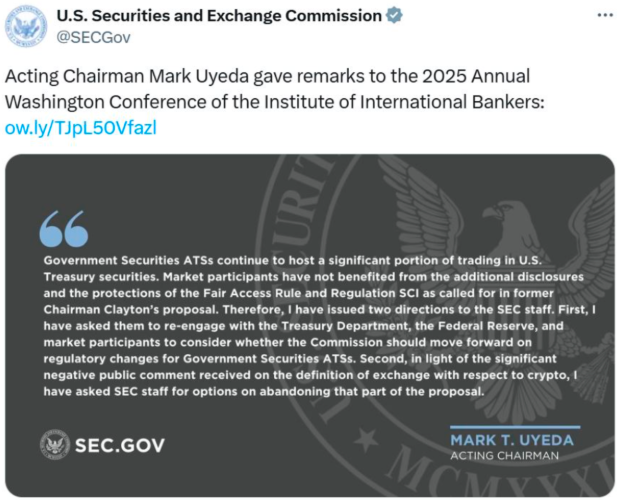Policy Background and Key Adjustments
On March 10, 2025, Mark Uyeda, Acting Chair of the U.S. Securities and Exchange Commission (SEC), announced at the International Bankers Association conference that the agency would reconsider a regulatory rule proposed in 2020. This rule sought to bring cryptocurrency firms—including DeFi protocols and trading platforms—under the Alternative Trading System (ATS) regulatory framework.
This policy shift stems from strong industry opposition to regulatory overreach, particularly regarding the vague definition of “exchange” in the original proposal, which could have encompassed wallet services, messaging platforms, and even social media groups, leading to skyrocketing compliance costs.
Previously, former SEC Chair Gary Gensler pushed for amendments requiring crypto firms to adhere to compliance standards similar to those of traditional securities exchanges, including disclosure obligations and anti-money laundering (AML) measures. However, following the Trump administration’s return to office, regulatory policies became more relaxed. In February 2025, the SEC dropped investigations into Uniswap and Coinbase and established a crypto task force led by Hester Peirce to create a more transparent regulatory framework.

Opportunities for Compliant Exchanges and Market Reactions
This regulatory relaxation presents direct benefits for compliant exchanges. Platforms such as JuCoin stand to gain from a clear compliance framework, with their security measures and asset custody capabilities (e.g., cold wallet management and multi-signature mechanisms) becoming key attractions for institutional investors.
Notably, JuCoin and other compliant exchanges have launched a “Compliance Alliance Program”, collaborating with Chainalysis to develop on-chain AML tools that reduce regulatory costs. This technological integration strengthens the competitiveness of major exchanges and provides a security architecture model for smaller platforms.
Additionally, JuCoin’s recent listing of the ELX/USDT trading pair signals its expanding footprint in the Real-World Asset (RWA) tokenization sector, aligning with the SEC’s relaxed stance on crypto regulations.
Challenges for DeFi and Smaller Platforms
Despite the regulatory easing, DeFi protocols and smaller platforms still face significant hurdles. The SEC has yet to clarify its jurisdiction over “decentralized” protocols, meaning platforms like Uniswap may need to adjust their governance token models.
Compliance costs also pose a challenge—even if registration requirements are lifted, smart contracts must still meet transaction monitoring standards. JuCoin and other compliance service providers charge around $500,000 annually for these solutions, making it difficult for startups to afford regulatory technology.
Liquidity competition is another growing concern. Large exchanges’ staking yields put pressure on DeFi protocols, forcing investors to shift toward high-liquidity assets, which in turn reduces trading volume for smaller projects.
Three Key Focus Areas in Future Regulatory Framework
-
Token Classification Standards:
The SEC task force plans to release the “Digital Asset Regulatory Guidelines” in Q2 2025, which will define security tokens and utility tokens. If Bitcoin and Ethereum are officially categorized as non-securities, ETF approvals could accelerate. -
Cross-Border Cooperation Mechanism:
The SEC intends to introduce a “Cross-Border Sandbox”, allowing licensed exchanges like JuCoin to pilot international stablecoin initiatives, provided they meet global KYC/AML compliance standards. -
Investor Protection Enhancements:
Drawing from the New York CRPTO Act, the SEC may require exchanges to disclose market maker positions, increasing transparency in the trading ecosystem.
Risk Warnings and Strategic Recommendations
In the short term, market volatility may persist. If Bitcoin falls below the $72,000 support level, it could trigger a cascade of derivative liquidations. Investors are advised to,Prioritize investments in compliant exchange tokens;Avoid tokens from smaller, non-compliant exchanges;Monitor RWA tokenization and AI-driven trading sectors for emerging opportunities.
The SEC’s latest policy shift marks not only a turning point in regulatory stance but also a pivotal moment for crypto’s integration into traditional finance. Investors must balance compliance-driven opportunities with technological risks, positioning themselves to capture structural advantages in an evolving regulatory landscape.




